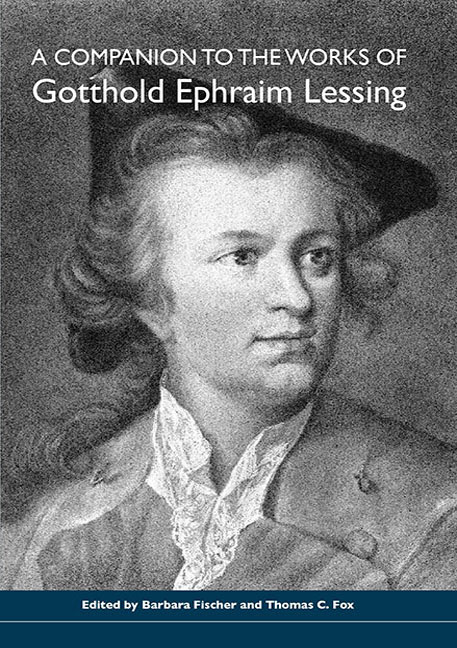Book contents
- Frontmatter
- Contents
- List of Illustrations
- Acknowledgments
- Lessing Editions and Abbreviations
- Selected Works by Lessing
- Introduction
- Lessing's Life, Work, and Times
- Criticism and Aesthetics
- Philosophy and Theology
- Drama and Drama Theory
- Lessing's Drama Theory: Discursive Writings on Drama, Performance, and Theater
- Gender and Identity in Lessing's Dramas
- Reception
- Contact Organizations
- Works Cited
- Notes on the Contributors
- Index
Gender and Identity in Lessing's Dramas
from Drama and Drama Theory
Published online by Cambridge University Press: 28 April 2017
- Frontmatter
- Contents
- List of Illustrations
- Acknowledgments
- Lessing Editions and Abbreviations
- Selected Works by Lessing
- Introduction
- Lessing's Life, Work, and Times
- Criticism and Aesthetics
- Philosophy and Theology
- Drama and Drama Theory
- Lessing's Drama Theory: Discursive Writings on Drama, Performance, and Theater
- Gender and Identity in Lessing's Dramas
- Reception
- Contact Organizations
- Works Cited
- Notes on the Contributors
- Index
Summary
In addition to their literary and formal innovations, Lessing's dramatic works have been canonized as important proponents of the new bourgeois value system and modern gendered identity. Lessing's plays create these gendered individualities in their most important social contexts, the familial value system and a new understanding of love. As we will see, while Lessing participated in establishing these new forms of gendered identities and their gender specific forms of social communication, he was not a simplistic champion of the bourgeois ideology informing them but was sensitive to the darker sides and contradictions of this new model. In particular, Lessing seemed to be suspicious not only of absolute values in general — the blind adherence to certain fixed norms within the schematic vice-virtue opposition — but also of the desirability of ascribing specific characteristics and behaviors to gender (gender stereotyping).
In the wake of Descartes and growing philosophical and theological skepticism came the need to assess the position and the stability of the individual, which prompted the modern concept of an individual identity.Our contemporary understanding sees identity as the imagined or discursive coherence of the person, which is socially constructed and maintained by intelligible norms, cultural symbols, and discursive formations. Unlike psychoanalytic studies of identity that read Lessing's plays themselves as representing the father's striving for “the stability or validity of his dream of masculine wholeness and unity,” the present essay attributes this quest only to the father figures in the plays, while their creator, Lessing, seems suspicious of such seemingly stable identities based on absolute value systems. In the following I will discuss gender, identity, and the critique of absolute virtue in Lessing's dramas. First, however, I begin with an explanation of some terms and concepts.
Gender is one of the historically constructed norms that stabilize “identity.” Judith Butler asserts that identity is always gendered and that one therefore cannot speak about identity without considering gender.My approach to gender studies emphasizes gender as a constructed historical and cultural phenomenon, the culturally and historically shaped interpretation of the physical body, and explores the construction and function of gendered individuality.
- Type
- Chapter
- Information
- A Companion to the Works of Gotthold Ephraim Lessing , pp. 231 - 258Publisher: Boydell & BrewerPrint publication year: 2005



